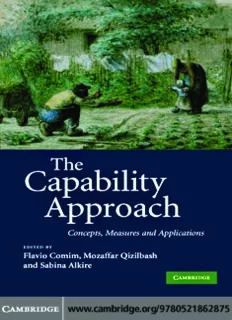
The Capability Approach: Concepts, Measures and Applications PDF
Preview The Capability Approach: Concepts, Measures and Applications
This page intentionally left blank The Capability Approach The capability approach developed by Nobel Laureate Amartya Sen has become an important new paradigm in thinking about development. However, despite its theoretical and philosophical attractiveness, there hasbeenscepticismabouttheusefulnessoftheapproachforpurposesof measurementandpolicyanalysis.Thisvolumeaddressestheseissuesinthe contextofpovertyandjustice.PartIoffersasetofconceptualessays,some ofwhichdebatethestrengthoftheoftenmisunderstoodindividualfocus ofthecapabilityapproach.PartIIinvestigatesthetechniquesbywhichwe canmeasureandcomparecapabilities,andhowwecanintegratetheminto povertycomparisonsandpolicyadvice.Finally,PartIIIlooksathowwe can apply the capability approach to different regions and contexts. Written by a team of international scholars, The Capability Approach is avaluableresourceforresearchersandgraduatestudentsconcernedwith the debate over the value of the capability approach and its potential applications. FLAVIO COMIM isDirectoroftheCapabilityandSustainabilityCentreat StEdmund’sCollege,UniversityofCambridge. MOZAFFAR QIZILBASH is Professor of Politics, Economics and Philo- sophyattheUniversityofYork. SABINA ALKIRE is Director of the Oxford Poverty and Human DevelopmentInitiative(OPHI)attheUniversityofOxford. The Capability Approach Concepts, Measures and Applications Editedby FLAVIO COMIM, MOZAFFAR QIZILBASH and SABINA ALKIRE CAMBRIDGEUNIVERSITYPRESS Cambridge, New York, Melbourne, Madrid, Cape Town, Singapore, São Paulo Cambridge University Press The Edinburgh Building, Cambridge CB28RU, UK Published in the United States of America by Cambridge University Press, New York www.cambridge.org Information on this title: www.cambridge.org/9780521862875 © Cambridge University Press 2008 This publication is in copyright. Subject to statutory exception and to the provision of relevant collective licensing agreements, no reproduction of any part may take place without the written permission of Cambridge University Press. First published in print format 2008 ISBN-13 978-0-511-39889-6 eBook (EBL) ISBN-13 978-0-521-86287-5 hardback Cambridge University Press has no responsibility for the persistence or accuracy of urls for external or third-party internet websites referred to in this publication, and does not guarantee that any content on such websites is, or will remain, accurate or appropriate. Contents Listoffigures pageviii Listoftables ix Listofcontributors xii Listofacronyms xiv Acknowledgements xvi Introduction SabinaAlkire,MozaffarQizilbashandFlavioComim 1 1 Usingthecapabilityapproach:prospectiveandevaluative analyses SabinaAlkire 26 PartI Concepts 51 2 AmartyaSen’scapabilityview:insightfulsketchor distortedpicture? MozaffarQizilbash 53 3 Sen’scapabilityapproachandfeministconcerns IngridRobeyns 82 4 Beyondindividualfreedomandagency:structuresof livingtogetherinthecapabilityapproach Se´verineDeneulin 105 5 Doesidentitymatter?Ontherelevanceofidentity andinteractionforcapabilities MiriamTeschlandLaurentDerobert 125 6 Measuringcapabilities FlavioComim 157 v vi Contents PartII Measures 201 7 Doconceptsmatter?Anempiricalinvestigationofthe differencesbetweenacapabilityandamonetary assessmentofpoverty CaterinaRuggeriLaderchi 203 8 SocialexclusionintheEU:acapability-basedapproach FotisPapadopoulosandPanosTsakloglou 242 9 Complexityandvaguenessinthecapabilityapproach: strengthsorweaknesses? EnricaChiappero-Martinetti 268 10 OperationalisingSen’scapabilityapproach:theinfluence oftheselectedtechnique SaraLelli 310 11 Operationalizingcapabilitiesinasegmentedsociety: theroleofinstitutions KanchanChopraandAnanthaKumarDuraiappah 362 PartIII Applications 383 12 Democracy,decentralisationandaccesstobasicservices: anelaborationonSen’scapabilityapproach SantoshMehrotra 385 13 Reinforcinghouseholds’capabilitiesasawaytoreduce vulnerabilityandpreventpovertyinequitableterms Jean-LucDuboisandSophieRousseau 421 14 Capabilitiesoverthelifecourse:atwhatagedoespoverty damagemost? ShahinYaqub 437 15 Socialpolicyandtheabilitytoappearinpublicwithout shame:Somelessonsfromafoodreliefprogramme inKinshasa TomDeHerdt 458 Contents vii 16 Thecapabilityapproachandgenderededucation:some issuesofoperationalisationinthecontextoftheHIV/AIDs epidemicinSouthAfrica ElaineUnterhalter 489 17 WomenandpovertyinMozambique:isthereagender biasincapabilities,employmentconditionsandliving standards? PierGiorgioArdeniandAntonioAndracchio 510 18 Fromthequantitytothequalityofemployment: anapplicationofthecapabilityapproachtothe Chileanlabourmarket KirstenSehnbruch 561 Index 597 Figures 0.1 Schematicoverviewofmulti-dimensionalpovertyfor individuali page9 1.1 ‘ProspectiveandEvaluativeAnalyses:Distinctbut integrallyrelated’ 33 6.1 DrawingbyaBrazilianchildcarriedoutaspartofthe anthropologicalexercisefor‘Voceˆ Apita’ 189 6.2 Satisfactionandpersonalincome 191 6.3 Schematicrepresentationsofcounterfactuals 192 6.4 Buildingcapabilityindicators:bringingtogetherconcepts andprioritiesandgoals 195 7.1 Thedistributionofreportedmorbiditybydecile 228 7.2 Graphshowinghowchildrenwithoutthefifthgradeof primaryschoolingaredistributedbydeciles 229 10.A.1 Graphicrepresentationsofmembershipfunctions 353 11.1 Aschematicillustrationoftheprocessbywhich resources,endowmentsandattributesaretransformed tofunctioningsandcapabilities 365 11.2 Relationshipbetweendegreeoffreedomand institutionalefficiencyandeffectiveness 369 11.3 Relationshipbetweeninstitutionalefficiencyand effectivenesswiththeproportionofpeopleableto accessanduseinstitutions 370 11.4 Freedom:Apublicgood(1),aclubgood(2)ora privategood(3)? 371 13.1 Adaptingthecapabilityapproach 424 13.2 Twocomplementarypolicies:poverty(expost)and vulnerability(exante) 425 15.1 Humiliationaffectingagency 472 viii
Description: